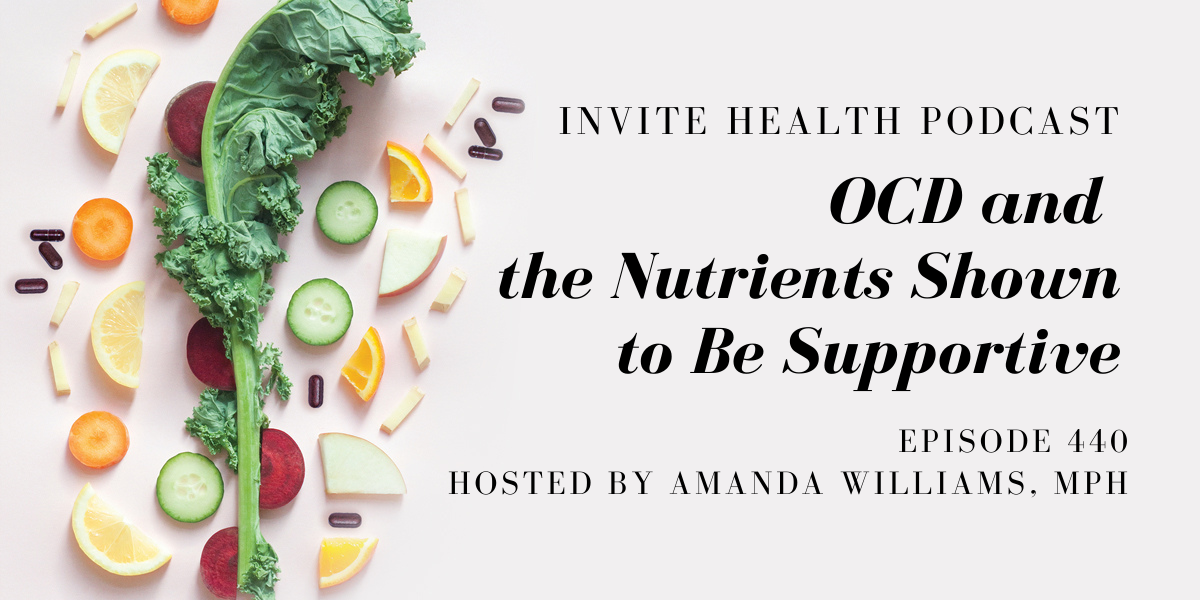OCD and the Nutrients Shown to Be Supportive – InVite Health Podcast, Episode 440

OCD
InViteⓇ Health Podcast, Episode hosted by Amanda Williams, MPH
Subscribe Today!
Today, I want to talk about what OCD actually is and how this can impact your life. It’s not super common, but I suppose that everyone, to some degree, maybe has a little bit of OCD tendencies. I want to define what OCD is, talk about the statistics of OCD within the population and what type of nutrients would be beneficial if someone has been diagnosed with or shows tendencies related to OCD.†
What is Obsessive Compulsive Disorder?
We know that Obsessive Compulsive Disorder (OCD) is a big issue for someone who has been diagnosed with this. People will experience unreasonable, uncontrollable or recurring thoughts, followed by a particular behavioral response. When we think about the compulsions, that’s the repetitive behavior that is brought on by the obsession or repeated thoughts and urges.†
This can drive up a whole lot of anxiety and stress for people who are dealing with this issue. When we think about the compulsive behaviors, we look at things like checking to make sure your coffee pot is turned off or that you locked your door. If you’re repeatedly washing your hands, not in a healthy way, but in an obsessive compulsive way. This can get to the point where it really starts to impact people’s social interactions.†
There can also be mental compulsions, where maybe you’re having to do certain counting or mental checking on certain tasks that you’re doing.†
How to help with OCD
There are certain things that can help mitigate the symptoms of OCD. For instance, learning to deal with daily stressors can be beneficial because the more stressed someone is, the more likely it is that these symptoms will appear. It’s very important to look at stress and how this can exacerbate this issue. We also have to look at deficiencies in terms of different nutrients that may be triggering this.†
We can look at the different nutrients that have been linked to being supportive to those who are dealing with this. One of the most widely studied nutrients is NAC, which is N-acetylcysteine. Many double-blind, placebo-controlled trials have shown that NAC can really make a significant impact for those who have been diagnosed with Obsessive Compulsive Disorder. A meta-analysis done in 2015 looked at the use of NAC in patients who were diagnosed with OCD. They looked at clinical trials where patients received 2400mg to 3000mg of NAC each day. They found very encouraging results that demonstrated that the utilization of NAC was incredibly impactful to the diminishing of those obsessive compulsive behaviors.†
Another interesting find comes down to B-vitamins and Vitamin D. Researchers have found a link between Vitamin B12, folic acid, homocysteine, Vitamin D levels and OCD. They looked at children and adolescents who had Obsessive Compulsive Disorder and they started to see that those with OCD had significantly lower levels of Vitamin B12, Vitamin D and folic acid, but yet had high levels of homocysteine, so that inflammation was already occurring in childhood. Vitamin B12 is a cofactor for the synthesis of key neurotransmitters such as serotonin and dopamine, which are involved in the pathophysiology of OCD. Because of this, B12 deficiency can affect mood, emotion and sleeping and act as a stepping stone to the onset or development of certain conditions such as OCD.†
HOW SPECIFIC GENES IMPACT YOUR MOOD & HEALTH – INVITE HEALTH PODCAST, EPISODE 202. Listen Now>>
In this episode, Amanda Williams, MPH explains Obsessive Compulsive Disorder. She details how this issue can present itself, discusses how common it is and provides recommendations for clinically-studied nutrients that may help support people who have been diagnosed with this condition.†
Key Topics:
- Examples of obsessive compulsive behaviors
- How common is OCD?
- The relationship between OCD and mental health
- Research on NAC
Thank you for tuning in to the InViteⓇ Health Podcast. You can find all of our episodes for free wherever you listen to podcasts or by visiting www.invitehealth.com/podcast. Make sure you subscribe and leave us a review! Follow us on Facebook, Twitter and Instagram at InViteⓇ Health today. We’ll see you next time on another episode of the InViteⓇ Health Podcast.


